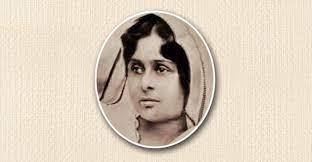India Celebrates Azadi Ka Amrit Mahotsav with Basanti Devi
(1880 – 1974)

- Born to Baradanath Haldar, a diwan, financial minister to Assam state under British colonial rule, Basanti Devi was an independence activist during the British rule in India.
- Basanti studied at the Loreto House, Kolkata, where she met and married Chittaranjan Das at the age of 17.
- Following her husband, Basanti Devi took part in various movements like the Civil disobedience movement, Khilafat Movement and also the Nagpur session of Indian National Congress in 1920.
- After the arrest of Chittaranjan Das, Basanti Devi became in-charge of his weekly publication Bangalar Katha (The story of Bengal).
- She was the president of Bengal Provincial Congress in 1921-22. Through her speech at the April 1922 Chittagong conference, she encouraged grass-root agitation. Travelling around India, she supported cultural development of arts in order to oppose colonialism.
- After Chittaranjan Das’ arrest in 1921 and death in 1925, Basanti took active part in various movements and continued with social work post-independence.
- In 1921, she joined Chittaranjan Das’ sisters Urmila Devi and Sunita Devi to establish the “Nari Karma Mandir”, a training centre for women activists.
- In 1920–21, she was instrumental in collecting gold ornaments and 2000 gold coins from Jalpaiguri towards the Tilak Swaraj Fund.
- During the Non-cooperation movement in 1921, the Indian National Congress called for strikes and ban on foreign goods. Basanti went on the streets despite Subhash Chandra Bose’s (who considered her as his “adopted mother”) warnings that it would provoke the British to arrest her.
- On 10 December 1921 police arrested Das and Bose. This was Bose’s first arrest. In total he was arrested eleven times by the British.
- Basanti Devi is noted to be amongst the four prominent women in Bose’s life; the other three being his mother Prabhabati, his sister-in-law Bibhabati (wife of Sarat Chandra Bose) and his wife/ companion Emilie Schenkl.
- Post India’s independence in 1947, Basanti Devi continued with social work.
- Basanti Devi College, the first women’s college in Kolkata to have been funded by the Government, was established in 1959 and named after her.
- She was presented with the Padma Vibhushan, the second-highest civilian award of the Republic of India in 1973.



 Each title in our collection is more than just a book - it’s a ‘green gift’, promoting mindful reading, sustainable values, and a culture of eco-conscious living. By gifting books, you open doors to new ideas, support lifelong learning, and nurture a more informed, compassionate, and environmentally aware individual.
Each title in our collection is more than just a book - it’s a ‘green gift’, promoting mindful reading, sustainable values, and a culture of eco-conscious living. By gifting books, you open doors to new ideas, support lifelong learning, and nurture a more informed, compassionate, and environmentally aware individual.